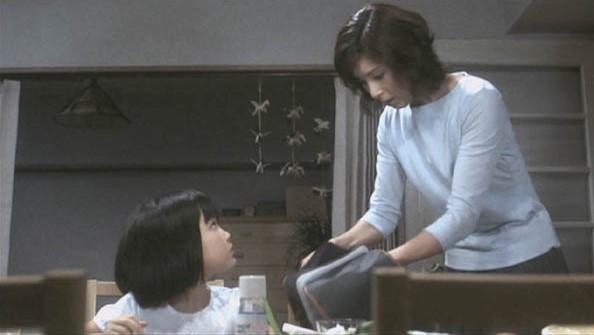Dark Water
2002

Rated: PG-13
Genre: Drama, Horror
Country: Japan
Run-Time: 1h 41min
Director: Hideo Nakata
Cast
Hitomi Kuroki……….Yoshimi Matsubara
Rio Kanno……………….Ikuko Matsubara
Mirei Oguchi………….Mitsuko Kawai
After finding success with his 1998 horror classic Ringu, Japanese director Hideo Nakata went back to the well and adapted a second Kojl Suzuki novel for the screen. The result was the lesser-known Dark Water: a film that arguably has more in common with the 1980 Canadian cult-horror classic The Changling than it does any of its J-horror brethren, even though the main antagonist is still a long-haired ghost girl.
Dark Water follows Yoshimi Matsubara (Hitomi Kuroki), an unemployed single mother caught in a nasty divorce proceeding. Because she is the mother, Yoshimi has the upper hand in her fight over custody of their six-year-old child Ikuko. But her history with mental illness and her struggles to start a new life mean that her status as Ikuko’s main caregiver is not guaranteed.
Being financially strapped, Yoshimi is forced to settle on an apartment in a crumbling old complex near a school. The apartment offers plenty of space, but the roof leaks and management is inattentive. Plus, that elevator is just plain creepy. So sets the stage for another great Hideo Nakata ghost mystery.
Compared to Ringu, Dark Water is a much more contained and personal affair. This is not a story setting up for franchise potential. Believe me when I say that when Dark Water is done, it feels done. There really is no place else to go with the story, unless, of course, it gets an inferior American remake…which it did in 2005.
Fans of Ringu will notice shades Nakata’s filmmaking technique in Dark Water. Like Ringu, Dark Water has a throwback feel to it. There is not really any reason this film could not had been made in 1970s. The film scares with practical effects and good storytelling, all enhanced by experienced horror editing. Also, like Ringu, we are leading up to one big climatic scare, though when it comes, we are not caught quite as much off guard this time.
However, while Ringu focuses on the horror in its mystery, Dark Water puts more emphasis on the drama. Nakata spends a lot of time getting us to empathize with Yoshimi during a difficult point in her life. Her money is limited, she has little support, and her husband is willing to exploit all her past flaws, no matter how insignificant. Even without those strange occurrences in the apartment, her life is not easy. She is being stretched too thin and oversensitive about her daughter because of her own past abandonment.
As for as haunted house (in this case an apartment) movies go, Dark Water stands out for the surprising amount of sentimentally added in the story. Do not get me wrong, the trials that await Yoshimi are- in classic J-Horror fashion- terribly bleak, but there is also a tenderness rooted in extra layers of depth behind this ghost’s additional motivations. For some, this could be a turn off, but for other, this is what makes Dark Water an enduring experience. (However, I admit that I dislike two of the soundtrack choices that came at the end of the film…though one is just the end credits song.)
Although Dark Water admittedly does not punch as hard as many better-known J-Horror films, it has much more heart. Dark Water tells a tale of abandonment and sacrifice that stays with you. If you are a fan of ghost stories, then this is must-see film. Just don’t let the PG-13 rating fool you. Dark Water is a slow-burn, but when Nataka finally delivers his big scare, he reminds us why he is considered a master in modern horror filmmaking.
